There are many ways to live more sustainably by conserving nature and natural energy resources.
Be water wise
Water is a precious resource in Western Australia, so it is essential to reduce consumption and protect water sources.
In addition to the information on this page, the Australian Government’s Your Home website has great information about how you can help reduce water consumption and improve water quality. View the Your Home website for tips.
Using less water is really important and there are numerous ways you can do this. For example:
- Use waterwise plants
- Install aerators and flow restrictors to taps and showers
- Install water efficient products
- Use wastewater to irrigate gardens
- Find and fix leaks quickly
- Take shorter showers
- Collect rainwater / install a rainwater tank
- Choose water efficient appliances – learn how on the WELS website.
For more tips, visit the Water Corporation website.
By keeping water catchments in good condition we help preserve the health of our waterways.
In the City of Swan, our catchments drain into waterways which eventually drain into the Swan River. The health of water catchments is extremely important, so the City completes regular water quality monitoring at various sites including popular swimming beaches along the Swan River.
You can help protect waterways by:
- Minimising pollution
- Being waterwise
- Growing native plants
- Installing a waterwise verge
- Practising smart pesticide use
- Fertilising wisely
- Joining a Friends or community group
- Washing your car on the lawn
- Picking up your dog’s waste and put it in a bin
- Using phosphorus-free detergents when washing clothes or dishes
- Composting your leaves and grass clippings – don’t let them be washed or blown into the drain.
Read more details and tips in our Waterways and Wetlands brochure.
The City of Swan is a Gold Waterwise Council and encourages schools, developments and golf courses to become involved with various waterwise programs.
Waterwise Schools Program
Waterwise Golf Course Program
Waterwise Council Program
Waterwise Development Program
View the City of Swan Local Developments and Infill Projects – Information Sheet to learn more about Green Star Developments, EnviroDevelopment, One Planet Living and the Living Community Building Challenge.
Regardless of how efficient an appliance is and how much or little water is used, the wastewater generated will need to be disposed of. For most properties this is done via the Water Corporation's sewer system while for properties not connected to the sewer, this will mean disposal onsite.
There are different types of effluent disposal systems available each with their own advantages and disadvantages.
Some, like aerobic treatment units and grey water systems allow wastewater to be used to irrigate gardens. Grey water systems can also be installed on properties connected to sewer. Others such as nutrient removal systems and aerobic treatment units produce better quality effluents with reduced impact on the environment. Composting toilets remove the need for wastewater disposal from toilets altogether.
For more information about onsite disposal options including the application form and approval process, the City’s health services waste water disposal page could assist.
Be energy wise
Everyone can do something about climate change. There are many free, low cost actions you can take in your home and business to increase energy efficiency. These help reduce your carbon emissions and your contribution to climate change.
The first step in reducing your household energy usage is to understand how much you are using, and where you are using it around the home.
Measuring appliance energy use
Home Energy Audit Toolkits are available for loan from City of Swan libraries.
Calculate your carbon footprint
To find out your household's carbon footprint, use the Carbon Footprint Calculator.
There are many ways you can reduce energy consumption. The below websites provide comprehensive tips and useful resources to help you:
A carbon offset is a unit that represents a reduction in carbon dioxide and/or other greenhouse gases to compensate for emissions made elsewhere.
You can purchase carbon offsets if you want to compensate for the greenhouse gas emissions you make in your daily activities.
Carbon offsets are typically achieved by providing financial support to a project that helps reduce greenhouse gas emissions, for example, a tree planting project where the trees act as a carbon sink by absorbing carbon from the atmosphere. Other types of carbon offsets include renewable energy or energy efficiency projects.
Western Australian energy retailer Synergy has several green energy billing options available where renewable energy certificates (RECs) can be purchased from nationally accredited GreenPower renewable energy sources. This allows you to offset some or all of the carbon emissions from your electricity consumption.
Be waste wise
There are plenty of ways to be waste wise. If we all do our bit, we can make a big difference.
Check out the below tips or Great Sort for more ideas.
Below are a few tips on how you can get waste wise:
- Recycle properly - view our Waste and Recycling Guide
- Look for items with less packaging or buy in bulk
- Look for products that come in recycled or recyclable packaging
- Use reusable coffee cups and water bottles
- Use reusable bags
- Create plastic free lunch boxes for school or work
- Dispose of food scraps and garden waste by composting, keeping chickens or using a worm farm
- Attend a City of Swan recyclable goods drop off day
- Visit the Foodwise website for ways to reduce food waste
- Visit the Love Food Hate Waste website for better ways to buy, cook and save food.
- Chatterbox game
- Design a fourth bin lesson plans
- FOGO bin colouring sheet
- FOGO crown
- FOGO find 'n' seek black and white version
- FOGO find 'n' seek colour version
- FOGO word scramble
- Mascot colouring sheet
- Strawberry ice cream lesson plans
- Strawberry ice cream worksheet
- Waste management crossword
- Waste management word search
- Waste sort challenge
- Waste starts with you worksheet
The City of Swan has waste education games for hire. The games teach kids about bin sorting, recycling, and sustainability, in a fun interactive way. Games include:
- Bin sorting activity
- Litter bingo
- Memory game
- Mini bin card sorting activity
- Puzzles
- Sustainable city floor map game
- Sustainable house floor map game
- Talking My Language kits (multilingual learning resource)
- Waste and ladders floor map game
- Waste sort tabletop game
- Waste themed books
- Waste toss game
You can book games and activities for up to one week. Collection is at the City of Swan Depot, 212 Great Northern Highway, Middle Swan. Please contact us to check equipment availability before completing the booking form.
Games and activities
Bin sorting activity
Try your recycling knowledge by sorting a bag full of materials into the correct bin or locations.
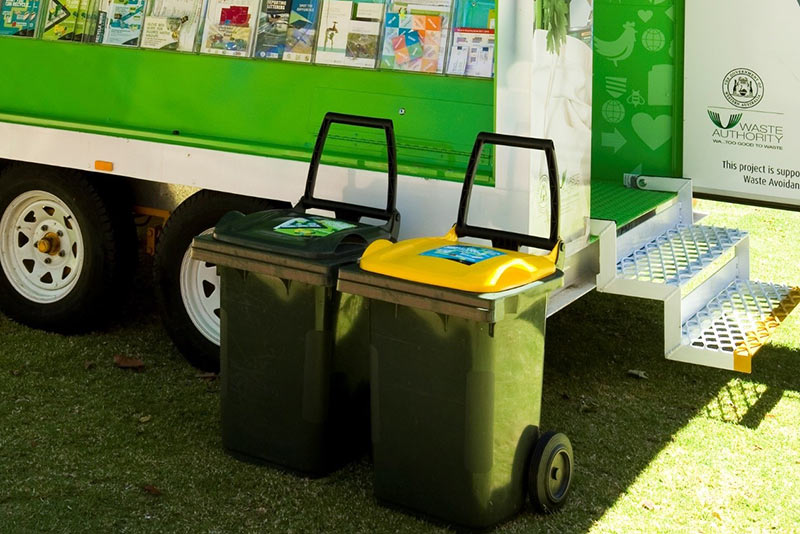
Litter bingo game
Use bottle tops to match the called piece of litter. The first one to match all the pieces shout BINGO wins!
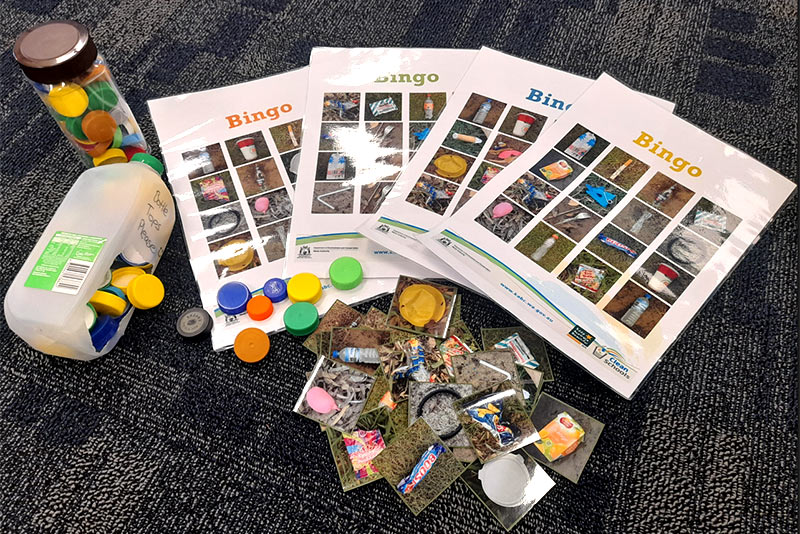
Memory game
We have lots of litter in one of the City of Swan parks; find them all to clean up the park.
To play the game, all pictures need to be turned over, each player has a turn at remembering where the matching picture is located. When you match a pair, take it off the board, the game is finished when the park is cleared. The person with the most pairs wins.
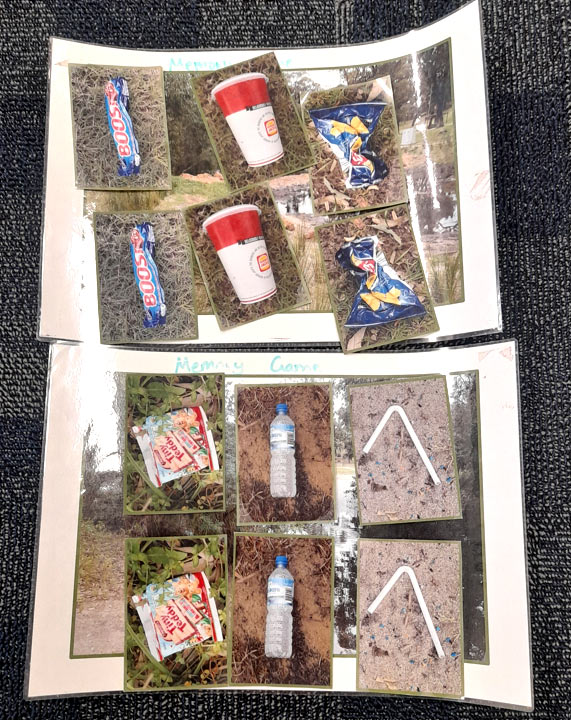
Mini bin card sort activity
Place the correct coloured card into the correct bin. Building an association between the item, colour, and bin. Great for young kids!
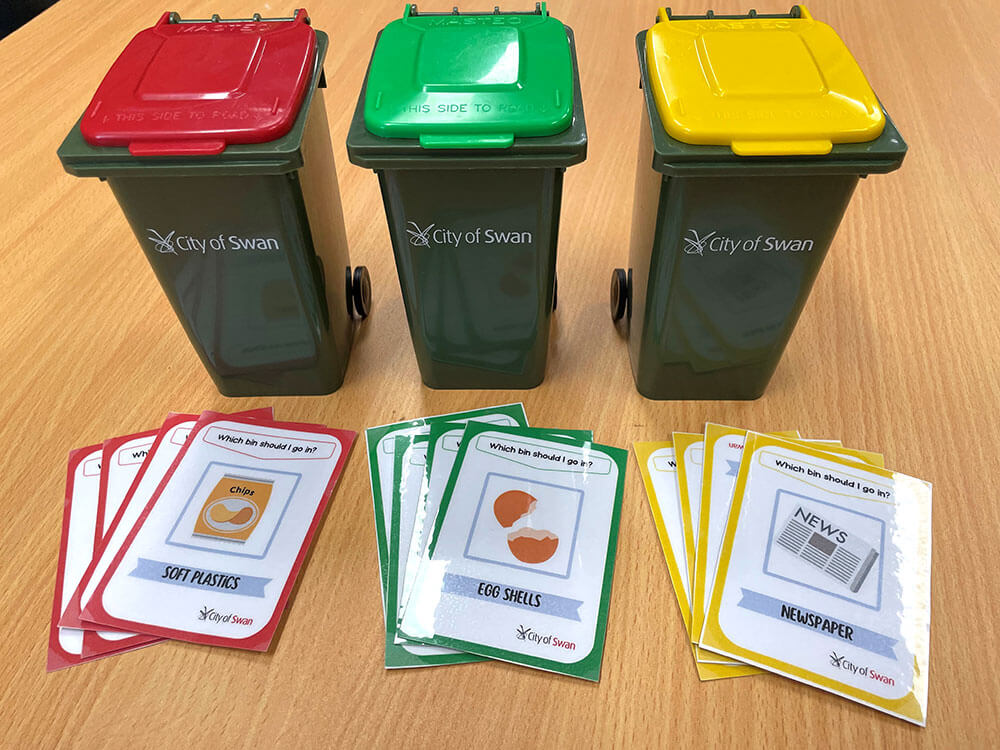
Puzzles
Complete the puzzles to learn about recovering finite resources to help our planet. Great information and messages on the back of the puzzles as well!
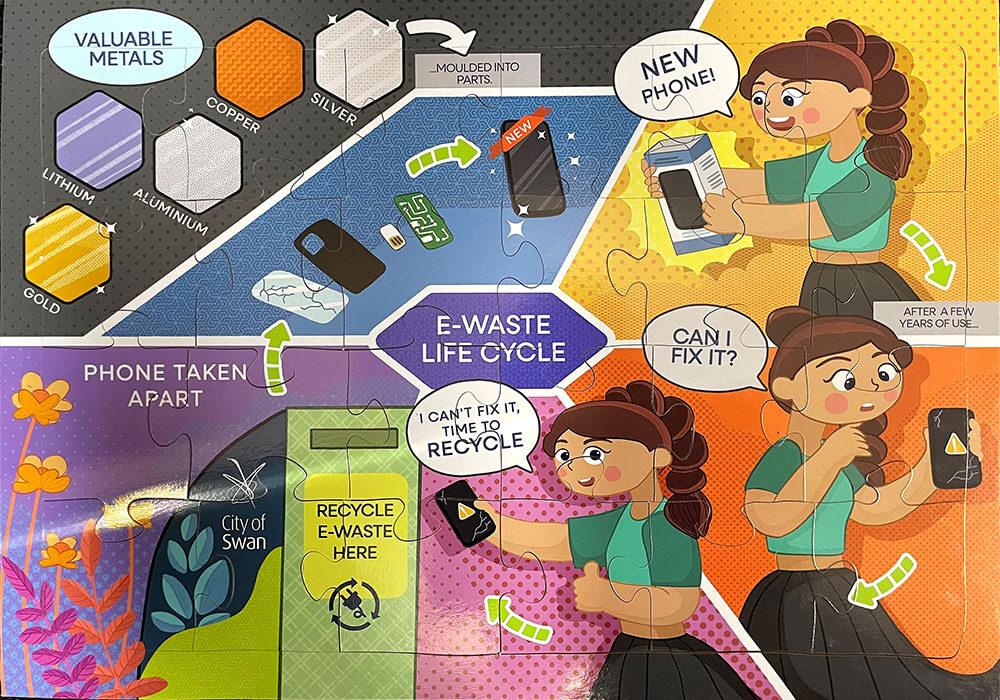
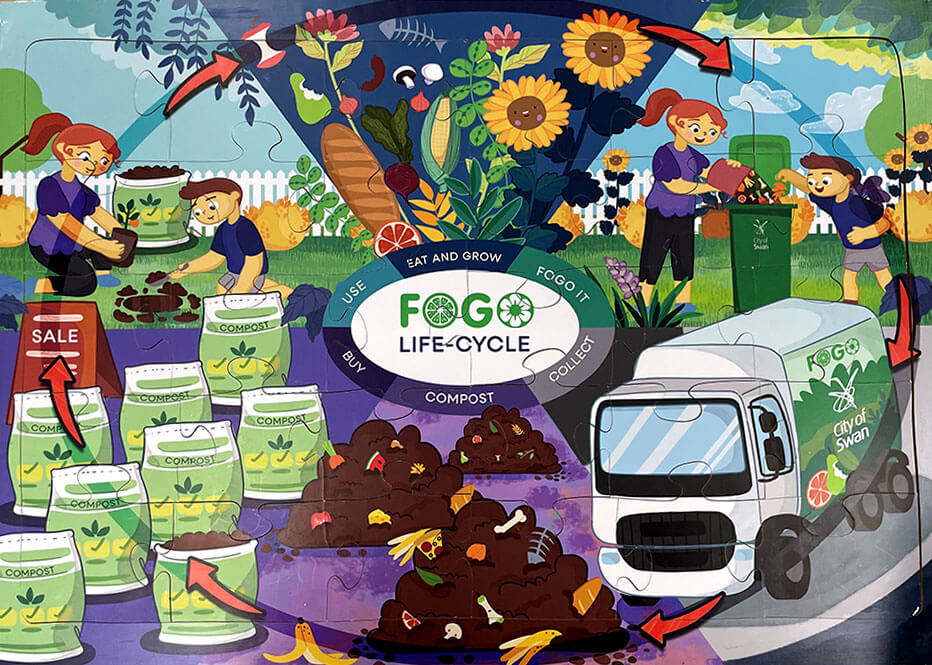
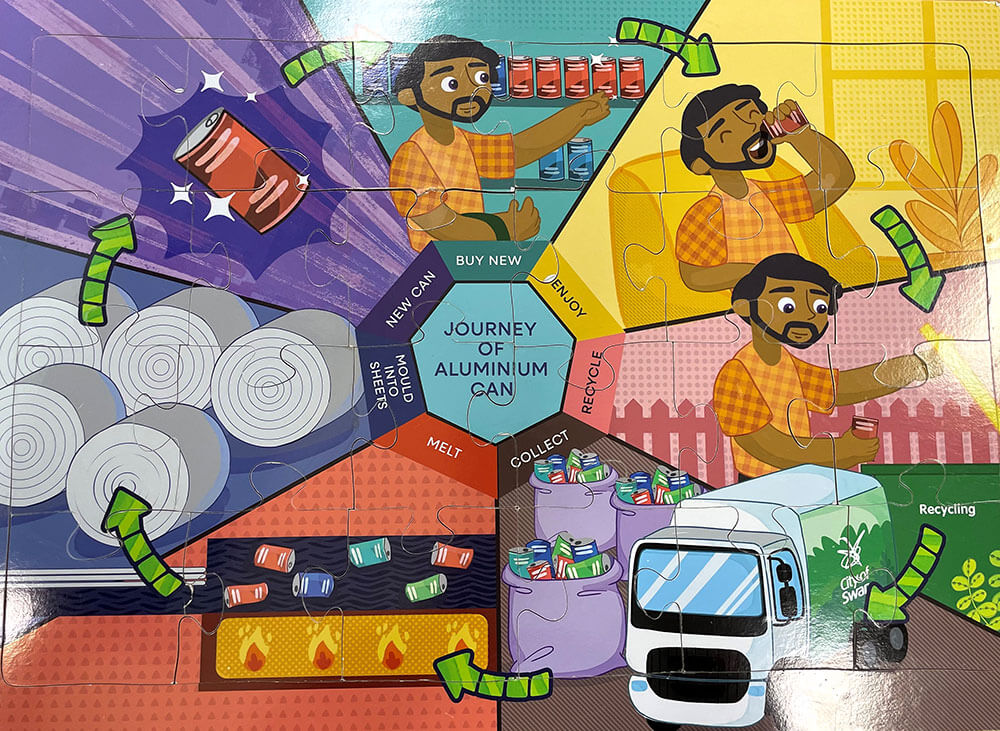
Sustainable City floor mat game
Find all the items on the list in the Sustainable City game. Can you find the other items in the City that are not listed?
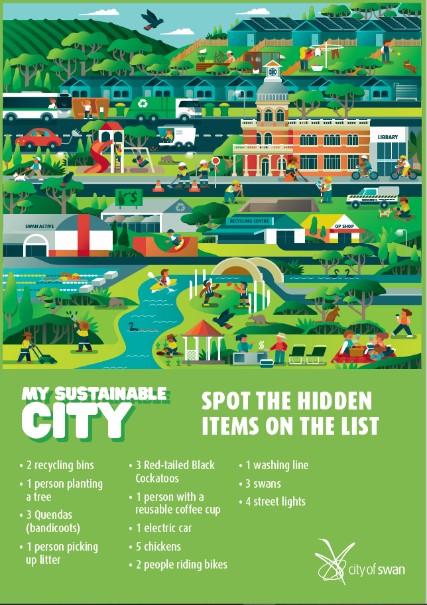
Sustainable House floor mat game
Roll the dice and land on actions and questions about sustainable living. Answer correctly and you move forward, get it wrong and be slowed down. First one to finish wins!
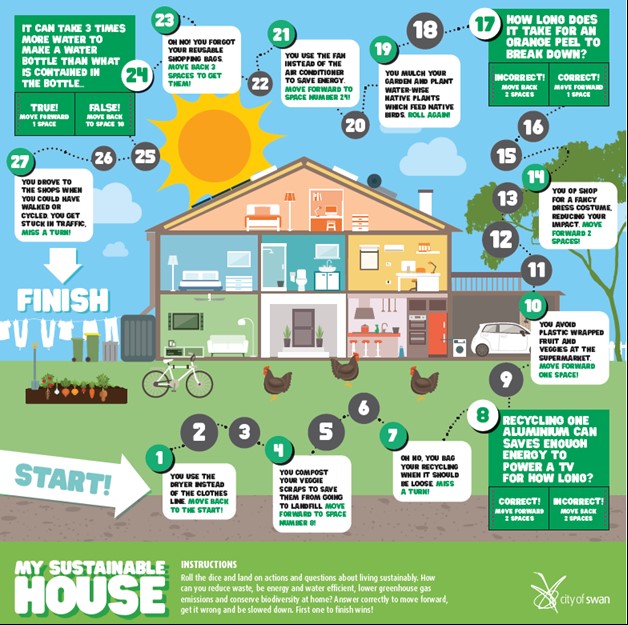
Talking My Language kits (multilingual learning resource)
A multilingual interactive self-correcting learning resource. Designed to assist those from culturally and linguistically diverse (CALD) backgrounds to better understand the three-bin system and how to sort their waste. Available in 5 languages (Arabic, Chinese, Hindi, Tagalog and Vietnamese).
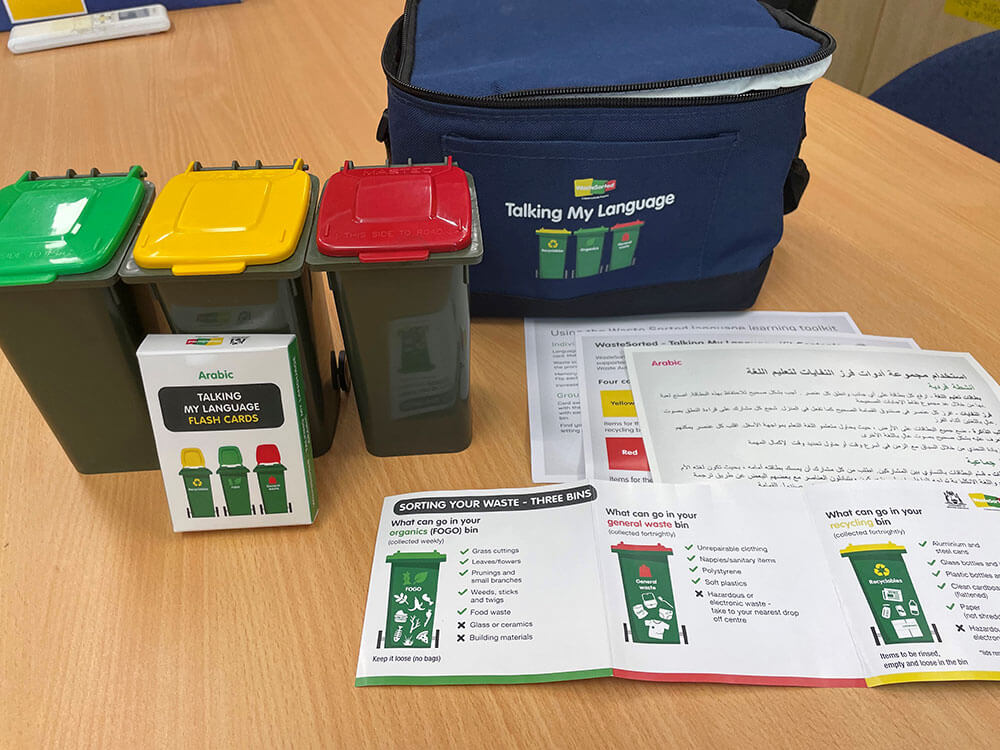
Waste and ladders floor mat game
Take turns to roll large foam dice and move across the 3x3m vinyl floor board. Moving up the ladders and down the rubbish trucks. First to the end wins!
Available to loan in the two and three bin system.
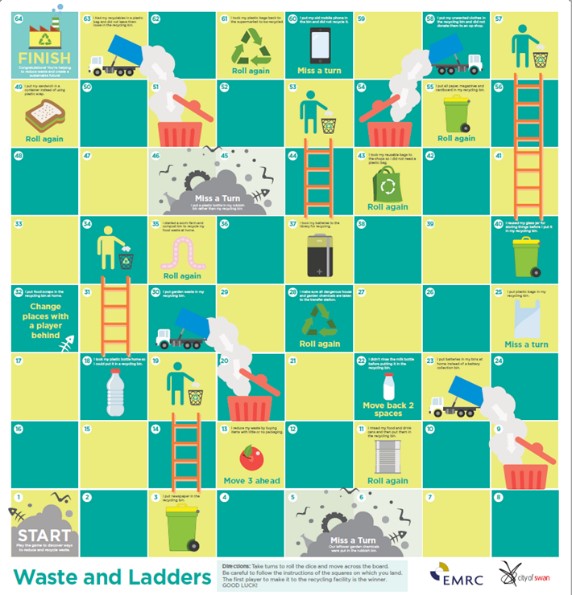
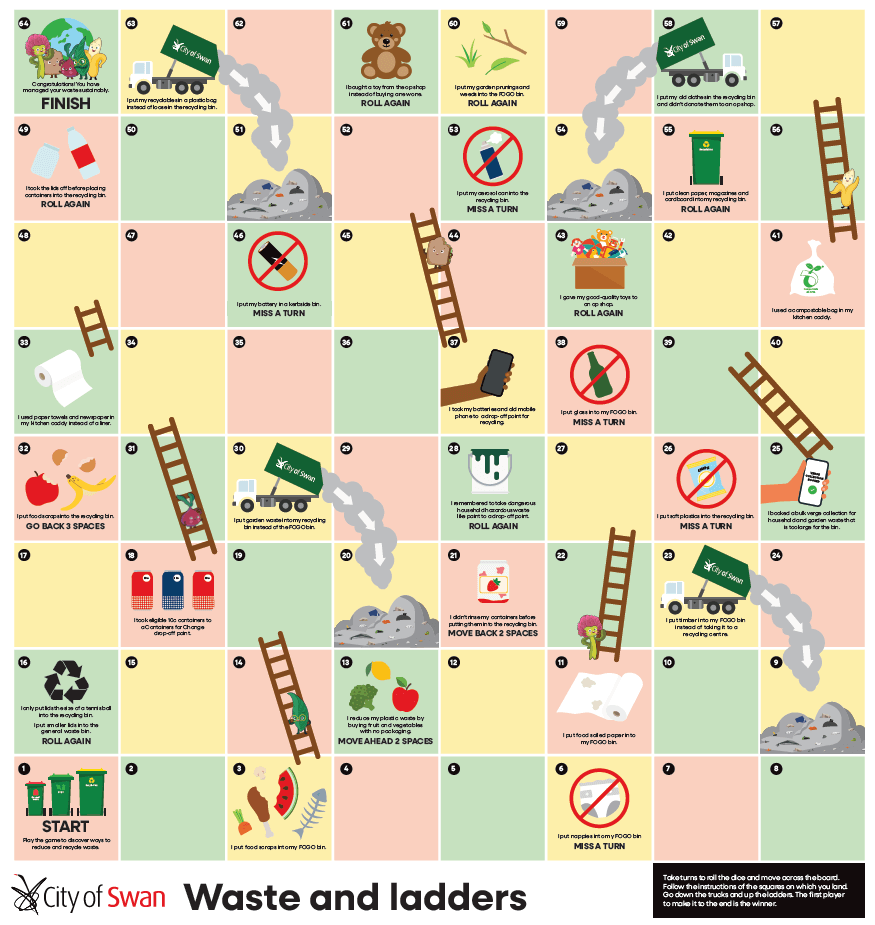
Waste sort tabletop game
Test your waste sorting knowledge to place all the ikons on the correct coloured bin lid.
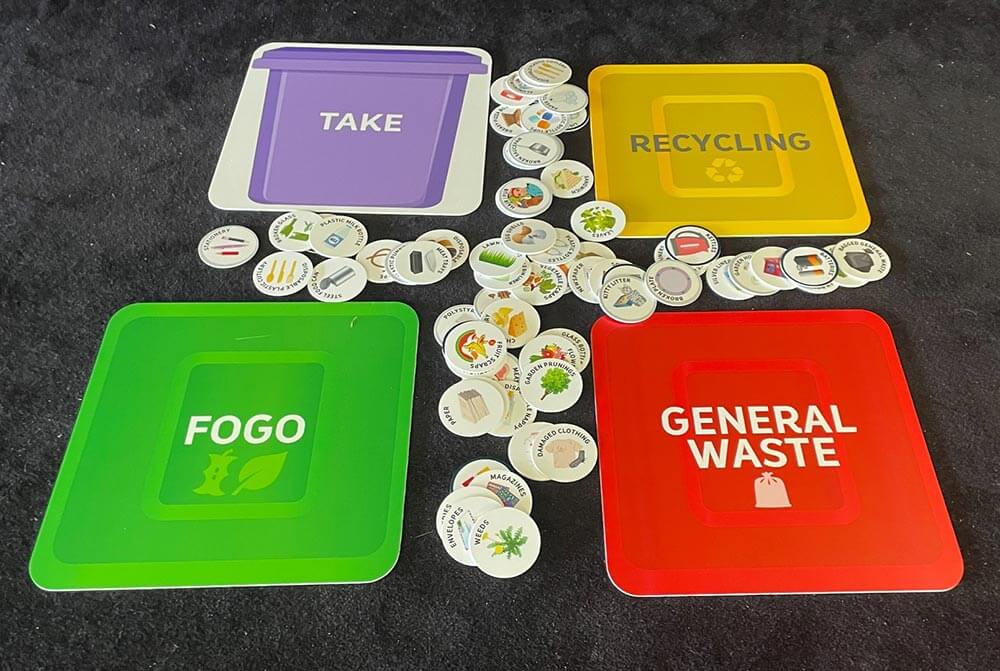
Waste themed books
These books are most suitable for primary school ages.
Strawberry Ice Cream Saves the Planet – A book about the Chapman family who return home to the City of Swan, to the new three bin system. They learn correct waste sort practises as well as other waste minimisation concepts along their journey of managing their waste.
Plastic Free – Zara’s homework is to have a plastic-free weekend. Join her to lean ways to remove plastic from our lives and make a positive change for the environment.
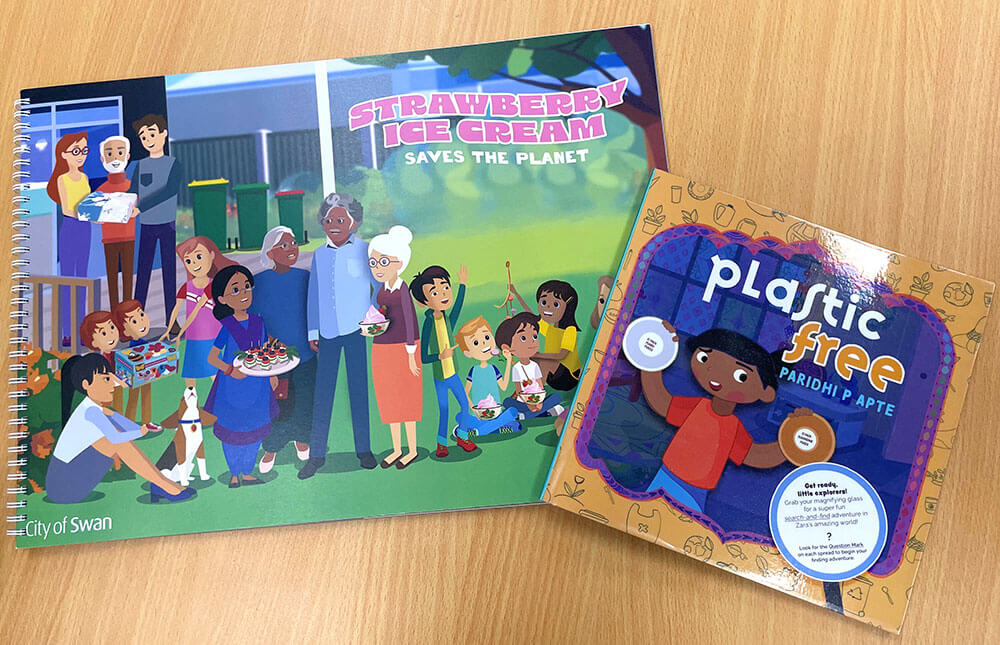
Waste toss game
Test your knowledge of waste sorting. Throw the stick to knock over the waste ikons, each ikon you knock over needs to be sorted onto the correct coloured bin lid.
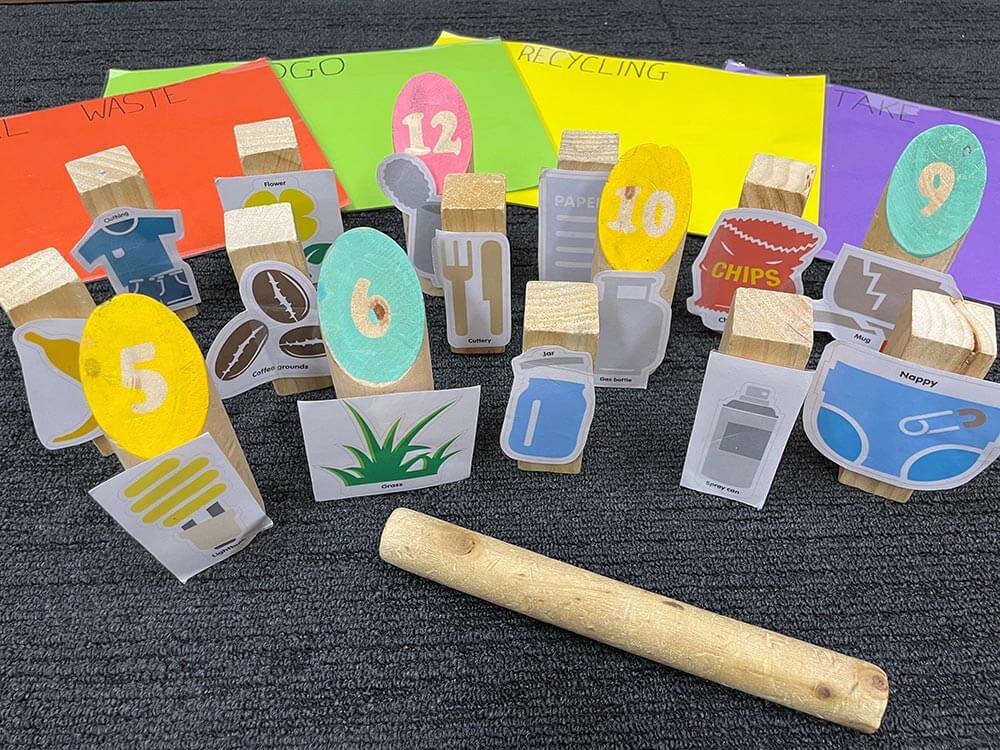
Please contact us to check equipment availability before completing the booking form.
The incursion cycles students through various stations where they engage in fun, interactive activities related to the City’s three-bin kerbside collection system. These activities have been designed by teachers and include a complementary takeaway item to encourage students to continue their learning and initiate discussions at home.
The program has been designed for primary school students, after-school care and guide groups. Best suited to ages 8+.
These incursions are FREE. Bookings are available for one or multiple sessions to fit in with school schedules and volume of students.
Interested in booking one? Reach out to us at resourcerecoveryeducation@swan.wa.gov.au
Worm farming is a great way to turn your kitchen scraps into useful garden products, such as worm castings and 'worm wiz'.
Here at the City of Swan, we host worm farming workshops for residents and anyone who attends is eligible for a $125 subsidy on the cost of a worm farm! Find out more about these workshops on our events calendar.
Visit our waste services page to find out about:
- Bin services
- Recycling
- Verge collections
- Hazardous waste.
Want to reduce your impact by making your own every day products? Or maybe you'd like to make your own special gifts? Our handy recipe cards give you the tools to create your own sustainable:
Conservation
Threats to natural flora and fauna include land clearing, erosion and weeds. We encourage you to join us in conserving nature.
One of the biggest threats to our natural environment is land clearing. Other threats include arson, off road vehicles, overgrazing, diseases such as Dieback, fire wood collection, chemical run-off and illegal dumping. You can help reduce these threats by:
- Removing weeds frequently.
- Addressing erosion by installing vegetation, fencing waterways and installing treatments such as roc pitching or reed beds.
- Give time between burn offs to allow plants that produce and set seeds.
- Reporting arson to Crime Stoppers on 1800 333 000.
- Report illegal dumping and littering.
In the City of Swan, there are a number of native animals that can only be found in the south west of Western Australia. To help native animals you can:
- Grow native plants
- Put a bird bath in your garden and wash it daily
- Avoid using pesticides in the house and garden
- Look out for native animals when driving
- Do not litter
- After fishing, take fish hooks, line, sinkers, plastic bags home with you
- Join a wildlife or conservation group
- Manage your cats and dogs
- Never feed native animals.
The South East Regional Centre for Urban Landcare has produced a series of guides to help you select local native plants for your garden, and to use fertilisers in a more effective and responsible way.
Birdlife Australia has helpful information about:
- Ways to minimise your need for rodenticides
- What items to buy and avoid.
Whether you live in a rural or suburban area you will come in contact with native animals.
If you find a native animal that is in need of care please view our Glove Box Guide for Injured Native Wildlife or contact one of the following:
If you find a snake, remember they are an important part of our environment. Living with snakes in our homes or gardens can be challenging and if you need these to be removed the Wildcare Helpline coordinates a volunteer service.
Determining your vegetation complex and soil type can help you plan revegetation activities suitable for your block or neighbourhood nature reserve.
Check out these planting guides for different soil types:

